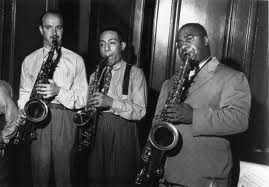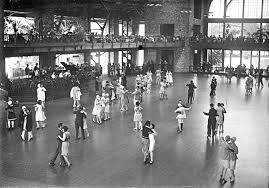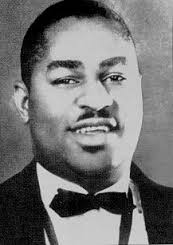Chu Berry, Tenor Wrapped in Swaddling
by Con Chapman
about Chu Berry, who was christened Leon.
How he got his name is perhaps an embarrassment,
then and now. Called to audition in Columbus,
Ohio, he was in the middle of a fraternity initiation and
when he arrived from Charleston, West Virginia,
he still had a hat on top of his hat, with holes cut

in it. He had to let his whiskers grow and he looked
like a character in a Chinese musical, Chu-Chin-Chow.
And that is how he ended up as Chu. He started playing
with Teddy Hill at all-night dances in Harlem
that started at 9 o'clock Saturday night and
continued through to 8 o'clock Sunday morning.
America could dance back then, instead of sitting on

its butt smoking a joint and grooving on noodling
guitar riffs that wouldn't get you second chair in
a school band back when Chu started, in the 1930's.
He's the first boss of the tenor after Coleman Hawkins,
and his complaint is “Doggone—ain't no meat here
at all! What that man mean, dishing me out this for
charmaine?” Two bits for three dances, dime a dance

for one is what the “hostesses” charge. He loved Hawk,
but he wouldn't imitate him. “Some of these tenor men,
I see they go off copying Hawkins and them. Shuck.
A man never get playing it really good till he putten something
into it, you think? A man don't watch out, all he putten is
spit.” He worked them out in his own way.
“Watch out for stale riffs,” he said, an admonishment that

could be applied to more art forms than just jazz. He warned
against “honking,” which he thought showed lack of
imagination and was (delicate phrase) “irksome to the ear.”
Charlie Parker named his son after him, he was that good.
One night Berry and Lamar Wright in his new car and
Andy Brown finished a one-nighter in Youngstown and
were heading for Canada. The bus with the rest of the band

was trailing them. Milt Hinton said he was sitting
up front, eating sandwiches and drinking beer, when the driver
slowed down and said “Something's going on out here—looks
like an accident.” Lamar Wright loomed out of the headlight
beams, his new car appeared in the night air, pointing straight up.
They heard Chu's voice, he was lying ten feet away, his skull opened up.
“Find my change,” was all he was saying. “I left my change around,

look for it.” His watch was in the middle of the highway, while
the band was still on his wrist. They got him in the bus and took him
to the hospital. He was so out of it, he wanted to go on, like the football
player he'd been at West Virginia State; unconscious from the blow,
prepared to carry on from memory alone, some dark part of the brain
where music plays and no language lives, because language hasn't
been invented yet. There was nothing but song first, then dance.

They played the dance at Buffalo that night in 1941, then Cab
Calloway got everyone together and told them that Chu was dead.
Poor Chu, his tenor wrapped in swaddling sweetness with Teddy Hill
and Calloway most of the time, eight bar solos at the most, when what
he wanted, what he needed to do, was air it out. He was like a
gaudy broach lying in cotton in a jeweler's box on a shelf.
Had he lived a little longer he might have seen the light of day.
|
1
fav |
1182 views
1 comment |
604 words
All rights reserved. |
Author's Note
The author has not attached a note to this story.
Other stories by Con Chapman
Tags
This story has no tags.
Nice tribute to one of the lesser known giants. Thanks for writing it. *